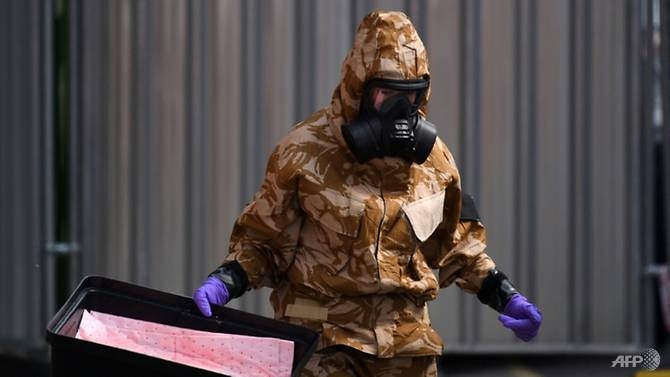From Russian spy poisoning to British death: The Novichok affair
 |
| An investigator wearing a protective suit in the English town of Amesbury, where a couple were found in critical condistion after coming into contact with the Novichok nerve agent AFP/Chris J Ratcliffe |
Here is a timeline of events since Novichok was identified in the poisoning of the Skripals in the southwestern English city of Salisbury in March, and resurfaced in the same area in July in a British couple.
SLUMPED ON A BENCH
Former double agent Sergei Skripal, 66, and his daughter Yulia, 33, are found unconscious on a bench in Salisbury on Mar 4.
Three days later, with the Skripals in hospital in critical condition, police say the pair were poisoned with a highly-toxic nerve agent.
On Mar 12, British Prime Minister Theresa May says the military-grade nerve agent has been identified as belonging to the Novichok ("Newcomer") group, which was developed by the Soviet government towards the end of the Cold War.
She says it is "highly likely Russia was responsible". Moscow rejects the claim.
DIPLOMATIC BACKLASH
On Mar 14, London says Moscow is "culpable" and pledges to expel 23 Russian diplomats. It suspends high-level diplomatic contact with Moscow.
The following day, Britain, France, Germany and the United States also blame Russia.
On Mar 17, Moscow says it will expel 23 British diplomats, among other measures.
On Mar 20, experts from the Organisation for the Prohibition of Chemical Weapons (OPCW) take samples.
MASS EXPULSIONS
A raft of Britain's allies announce on Mar 26 that they are expelling Russian diplomats because of the poisoning.
Washington says it is throwing out 60 Russian "spies" and closing the Russian consulate in Seattle.
By Mar 27 the number of Russian diplomats expelled from various countries and posts reaches 150.
Two days later Russia announces the expulsion of 60 US diplomats and the closure of the US consulate in Saint Petersburg.
On Mar 30 it says diplomats from another 23 countries, almost all EU members, will have to leave. Up to 50 more British diplomatic staff will be kicked out, it says.
SOURCE NOT VERIFIED
On Apr 3 the British military facility analysing the nerve agent - which appears to have been smeared on the front door handle of Skripal's home - says it has "not verified the precise source" of the substance.
The Kremlin demands an apology and on April 4 its foreign intelligence chief says the case is a "grotesque provocation ... concocted by the British and American security services".
Yulia Skripal is released from hospital on Apr 10.
Two days later, the OPCW confirms Britain's findings on the nerve agent but does not apportion blame.
The next day, National Security Adviser Mark Sedwill says Britain has information that Russian intelligence had been spying on the Skripals for at least five years before the attack.
On Apr 17, an operation begins to clean up affected areas of Salisbury.
Sergei Skripal is discharged from hospital on May 18.
TWO MORE POISONED
On Jul 4, police reveal that two people are in a critical condition after being found unconscious days earlier in the village of Amesbury, around 12 kilometres (eight miles) from Salisbury.
Later they confirm that the man and woman had come into contact with Novichok.
The situation is declared a "major incident" and counter-terrorism police take the lead in the investigation.
The next day Britain's interior minister Sajid Javid says Moscow needs to explain itself over the use of the toxic agent.
Russia slams Britain for playing "dirty political games" and demands an apology.
WOMAN DIES
Police say tests on the couple - Dawn Sturgess, 44, and Charlie Rowley, 45 - showed they had handled an unidentified "contaminated item".
They had visited Salisbury the day before they fell ill.
Police announce on Jul 8 that Sturgess has died.
Expressing shock, May says the incident is being investigated as a murder.
What the stars mean:
★ Poor ★ ★ Promising ★★★ Good ★★★★ Very good ★★★★★ Exceptional
Related Contents
Latest News
More News
- Russian President congratulates Vietnamese Party leader during phone talks (January 25, 2026 | 09:58)
- Worldwide congratulations underscore confidence in Vietnam’s 14th Party Congress (January 23, 2026 | 09:02)
- Political parties, organisations, int’l friends send congratulations to 14th National Party Congress (January 22, 2026 | 09:33)
- 14th National Party Congress: Japanese media highlight Vietnam’s growth targets (January 21, 2026 | 09:46)
- 14th National Party Congress: Driving force for Vietnam to continue renewal, innovation, breakthroughs (January 21, 2026 | 09:42)
- Vietnam remains spiritual support for progressive forces: Colombian party leader (January 21, 2026 | 08:00)
- Int'l media provides large coverage of 14th National Party Congress's first working day (January 20, 2026 | 09:09)
- Vietnamese firms win top honours at ASEAN Digital Awards (January 16, 2026 | 16:45)
- ASEAN Digital Ministers' Meeting opens in Hanoi (January 15, 2026 | 15:33)
- ASEAN economies move up the global chip value chain (December 09, 2025 | 13:32)

 Tag:
Tag:




















 Mobile Version
Mobile Version